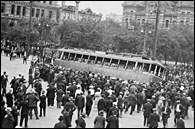The sum of our history
Last Thursday evening, history professor Desmond Morton began the first instalment of McGill's new "Public Memory, Citizenship and History Education" lecture series with a self-effacing anecdote.
 A scene from the Winnipeg General Strike in 1919, a seminal event in Canadian labour history.
A scene from the Winnipeg General Strike in 1919, a seminal event in Canadian labour history. |
|
Earlier that day, he reported, he was in an airport bookstore when he spied a stranger picking up a copy of his bestselling A Short History of Canada. The man flipped to the index, scanned a few pages, then returned the book to the shelf.
"I guess he didn't find his name," quipped the founding director of the McGill Institute for the Study of Canada.
Aside from illustrating Morton's trademark good-natured humour, the story made two sly points. The first was that, by and large, any attention is worth getting. Morton admitted he isn't too keen on bemoaning "the desperate crisis of history in Canada's schools" -- but at least the hand-wringing has people discussing history, which isn't a bad thing.
The second point echoed the title of Morton's lecture: "Canadian History: What's The Big Deal?" Eschewing the idea that Canadian history education is merely the rote memorization of dates and prime ministers (that is, the uncontextualized stuff of indices), Morton argued for a history that "contributes to citizenship."
History's "big deal," he continued, is about recognizing common experiences, about understanding how communities (and businesses, and industries, and...) evolve and connect to the rest of the world, about developing the capacity for reasoning and argument.
"If ignorance of our own country is distressing," he said, "then ignorance of the world is dangerous."
"Des did a really nice job of providing an introduction to the series," says Ruth Sandwell, the series organizer and a professor in both the Faculty of Education and the Department of History.
"The upcoming speakers pick up on his themes about identity, and what is good history, about why we do or don't care. Some of them will disagree with him, but he covered a lot of the topics that will come up later."
Sandwell envisions "Public Memory, Citizenship and History Education" as "a way to bridge the gap between education and history." Although she doesn't agree with the right-wing beliefs of the Dominion Institute (the privately funded group which spotlights the issue of history education by releasing stats of the "15% of Canadians think Ulysses Grant was a Canadian war hero" variety), Sandwell says she's nonetheless heartened by the current climate of debate.
"All of a sudden," she says, "issues of curriculum, which are usually just the business of bureaucrats and teachers, have become part of a debate over Canadian identity.
"The series is a response to a lot of different trajectories that are happening in Canada right now," she continues, adding that CBC Radio is taping the lectures for possible broadcast on Ideas.
"It's about a lot of strands coming together. There's the strand that is concerned with Canadian education and Canadian identity. There's the strand that's about allowing people to have knowledge about Canada. Then there's this growing belief, which the Quebec Ministry of Education explicitly believes, that the best way to teach students about citizenship is through history."
The latter point is exactly where Desmond Morton concluded his enthusiastic, upbeat lecture. "Historical consciousness is a tool in our hands," he said, "and it's a much better tool when we understand its uses and limitations.
"History gives us the possibility to be a little better than we are."
The "Public Memory, Citizenship and History Education" series continues with Peter Seixas on April 25 ("What is Historical Consciousness?"), followed by Timothy J. Stanley on May 2 ("Whose Public? Whose Memory? Racisms, Education and Nationalist History in Canada"), Keith Barton on May 30 ("Committing Acts of History: Humanistic Education and Participatory Democracy"), Annmarie Adams on June 6 ("Remembering Mudville: Canadian Wartime Housing and Architectural Change, 1942-92"), Jocelyn Létourneau on June 13 ("Remembering Our Past: An Examination of Young Quebeckers' Historical Memory"), and Chad Gaffield on June 20 ("The Blossoming of Canadian Historical Research: Implications for Educational Policy and Content").
All lectures are free and begin at 5:30 pm in the Jack Cram Auditorium of the Education Building. For more information, phone 398-5148.

